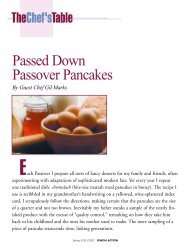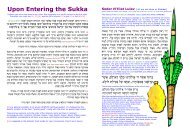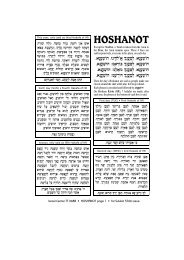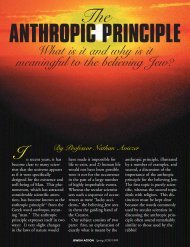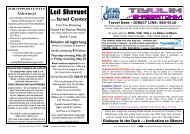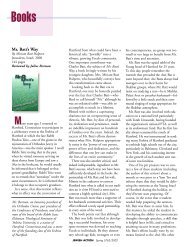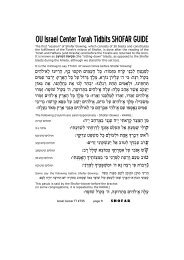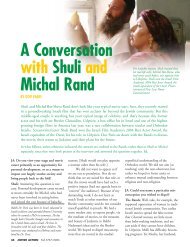Create successful ePaper yourself
Turn your PDF publications into a flip-book with our unique Google optimized e-Paper software.
y their flimsy protection), the scattered<br />
ones are vulnerable to his<br />
attack. It is only through<br />
Providence, evidenced by the uncanny<br />
feat of a couple of pigs outrunning<br />
a wolf, that that they are not<br />
entirely lost.<br />
<strong>The</strong> final episode, in which the<br />
first two little pigs do teshuvah and<br />
rejoin their wise, patient brother —<br />
who remained throughout the centuries<br />
steadfast in his brick-solid<br />
beliefs — is one of the most<br />
poignant in pig-literature. 7 By<br />
means of this touching reunion, the<br />
yetzer hara is boiled and served on<br />
toast, never again to be a threat to<br />
the world. A masterful messianic<br />
touch on the part of Reb Meshulem!<br />
Anyone who can still deny that<br />
this allegory was written by a Jew<br />
should reread my article until he is<br />
convinced. One more note of historical<br />
interest: It has been conjectured,<br />
not unreasonably, that the<br />
original story was about <strong>Three</strong> <strong>Little</strong><br />
Figs, but a printer’s error in the<br />
Hebrew transliteration added an<br />
unfortunate dagesh, rendering the<br />
story forevermore about pigs. It<br />
boggles the mind to think of the layers<br />
of meaning inherent in the story,<br />
should this legend be true. But that,<br />
of course, is an essay for another<br />
time.<br />
Notes:<br />
1. Most people from Gdansk are, of<br />
course, guarded when it comes to publicizing<br />
their birthplace – missing a vowel,<br />
as it is.<br />
2. O.K., I’m aware that there are other<br />
versions of this story in which the pigs<br />
are actually consumed by the wolf. But<br />
that would wreck my whole thesis, so<br />
I’m ignoring them.<br />
3. In some accounts, the pigs repeatedly<br />
do a little jig and sing, “Who’s afraid of<br />
the big, bad wolf?” but this is a fabrication<br />
added in the modern era by obtuse<br />
people who would destroy true meaning<br />
for the sake of including a stupid song!<br />
This is fairy tale revisionism in its most<br />
vile form. I disdain it.<br />
4. Reb Meshulem obviously belonged to<br />
the school of thought that held that pigs<br />
are kosher for literary allegorical<br />
purposes. Few people besides me know<br />
that this was a fierce rabbinic battle raging<br />
in Gdansk at the time. So Reb<br />
Meshulem was making a statement,<br />
indeed a psak, about the use of treif animals<br />
in literature through this story.<br />
5. Note here that that the distinguished<br />
Rabbi Akiva (who was not as literary as<br />
I, but a very good fellow) utilized a wolf<br />
to symbolize the very same forces of evil<br />
and assimilation inherent in the Roman<br />
Empire in his parable of the wolf who<br />
tries to entice the fishes to jump onto<br />
dry land. No, wait. That was a fox.<br />
Well, you get the idea, anyway.<br />
6. Each huff and puff actually represents<br />
an economic downturn or an anti-<br />
Semitic act, but you’d have to know<br />
Gdansk history to appreciate it. See my<br />
dazzling essay, “Istoricalhay Ecretsay foay<br />
Danskgay,” published in the Journal of<br />
Literary Conjecture and Inapplicable<br />
Knowledge, vol. 623, no 4, pp. 18-295.<br />
7. In contrast, see my inspired analysis<br />
of the hedonistic little piggies who went<br />
to market, stayed home and ate roast<br />
beef. New Journal of Irrelevant<br />
Scholarship vol.17, no. 5, pp. 11-95.<br />
NEW!<br />
HAMOTZI<br />
All Ten Words<br />
Available in leather-bound<br />
Deluxe Edition<br />
From ArtScrawl<br />
HAMOTZI All Ten Words!<br />
Genukshoin Edition<br />
Understand the Brachah on the Staple of Life!<br />
<strong>The</strong> Most Famous Blessing in the World!<br />
Translated...Transliterated...Annotated...Commentated<br />
With an Overview, Underview, and Aerial View<br />
written by real rabbis!<br />
Transliteration<br />
Commentary<br />
LECHEM<br />
bred<br />
<strong>The</strong> eighth <strong>The</strong> word’s<br />
word of the position in the<br />
brachah carries brachah, therefore,<br />
comes<br />
unusual significance<br />
being, after the most<br />
as previously important<br />
noted, eighth. word-hamotzi-<br />
Eight is, after [see commentary<br />
all, greater on previous<br />
than seven. page], signifying<br />
OJK<br />
bread<br />
monumental<br />
significance,<br />
according to<br />
our Sages. A<br />
point of controversy,<br />
raised<br />
by generations<br />
of poskim,<br />
over whether<br />
or not the<br />
Italian breadstick<br />
is, in fact,<br />
a form of<br />
bread worthy<br />
of the blessing,<br />
or whether it is<br />
a cracker. <strong>The</strong><br />
presence of<br />
sesame seeds,<br />
however, might<br />
Hebrew<br />
Translation<br />
JEWISH ACTION Spring 5760/2000



